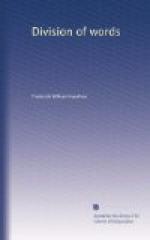This standardization of spelling is unfortunately not quite complete, although nearly so. Concerning the vast majority of the words in the English language there is no difference of opinion. A few words are differently spelled by different authorities. There are seven of these authorities of the first rank, three English, Stormonth, the Imperial Dictionary, and the Oxford Dictionary; and four American, Webster’s International, Worcester, the Century Dictionary, and the Standard Dictionary. American printers may ordinarily disregard the English authorities.
Any one of the four American authorities may be safely followed. In cases where two spellings are given in the dictionary consulted, take the first one. Ordinarily a printing office adopts one of the great authorities as a standard and conforms the office style to it. All office copy will follow it and all errors in copy from outside will be corrected by it. Spellings differing from it will be regarded as errors, even though supported by other authorities.
This rule, however, is subject to one very important exception. The author has an unquestionable right to choose his own dictionary or to use any spelling for which there is any authority, English or American. If he has his own ideas on the subject of spelling he should be very careful that his manuscript is correctly spelled according to his ideas, and clearly written or typed. He should also indicate on the manuscript the authority he wishes used in correcting the spelling in case of mistakes or illegible passages. Every care should be taken to make the manuscript copy as correct as possible and as legible as possible. Such care may be very troublesome at first, but it will result in great saving of expense.
In addition to the authorities named there are the rules and “reformed” spellings adopted by the American Philological Association and published by the United States Government. These are followed fully in some offices, partly in others, and in many not at all. This is a question of the office style and the author’s wish. If copy is clear and spelled according to any authority, it is the compositor’s duty to follow it. If it is misspelled or illegible he is to correct it according to the office style unless otherwise directed by the author in writing. If furnished with such a direction he is to follow it. This procedure will clear the compositor of all blame. Any questions which then arise lie between the author and the proofreader.




